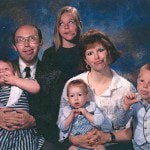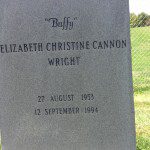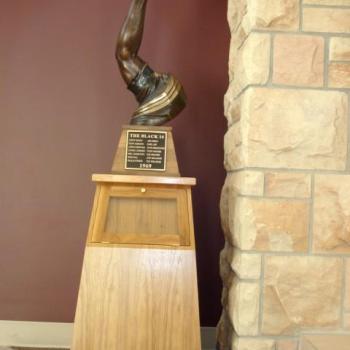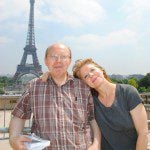
On June 7, I turned sixty-one. My two best friends, Jackie Selck Clegg and Elizabeth (Buffy) Cannon Wright, both died in their forties, Jackie of cancer and Buffy in a car crash. My aunt Carolyn also died in her forties. A heart attack took her. Two of my husband’s sisters died at age forty-five, one of cancer and one of multiple sclerosis. I look back over the twenty years which I got and they did not and contemplate what that time has meant. I did write some important books, but others are taking the torch I once carried and going further than I did. I’m grateful to be a spark in their bright light. I taught some great students, some of whom will become better writers than I ever was. But the big thing I did–which no one else could have done exactly like me–was to love my children.
After Buffy died, her husband–a would-be writer and a terribly weak and addicted man (he would give up their children within a month of her death)–reported having a vision of her. I wrote this account in a book I have not published, one I wrote for and to Buffy’s oldest daughter:
[Mike] was praying–or rather railing at God, telling Him he was sick of this B.S. And then your mom was there, with an entourage of angels, like the rushing of water. The head angel commanded Mike to grow up, to be a man and quit moping around. Then your mom–her spirit–said to him (in a spiritual way, as he described it–though sometimes she used real words), “Let me talk to him.” She put her hand on his leg. He could feel something, a little pressure. She said, “Come with me.”
She wasn’t taking him to God. She was taking him to you children. First to Annie’s bedside. Annie: three years old, round and brown, with hair like Shirley Temple’s. “Look at her, Mike,” Buff said. “Isn’t she beautiful? Do you have any idea who she is? All of her energy? All of her love?” She led him to the bedsides of each of you kids, and talked about you. “They are what count, you know,” she said. It didn’t matter if he published or not; you kids were far more important than any book. She told him not to mourn for her anymore, that he had been too dependent on her on earth and it was time to stand on his own, and that she would see him before too long. “Even if you don’t make it,” she promised him, “I’ll be there to embrace you when your time comes.” She said finally that she had to go now, and he wouldn’t see her again until it was his time. “This is goodbye. We’re very busy here,” she added, like she was mocking a cliche. Or explaining one.
Their conversation had lasted the whole night. She instructed him to write down all he had heard while it was still fresh in his mind. Then she was gone again.
Buff and I had a lot in common. We loved each other because we recognized ourselves in the other. We were similarly unorganized and sometimes overwhelmed by our children’s needs. She was a writer, too, and was working on her master’s thesis–in fact was on her way to work on it–when she was killed. Her death was one of several things which helped me understand that my writing was merely a talent, not the center of the world.
There was a time after Buff died when I was thinking about how messy I could be, what a failed homemaker. My thoughts were interrupted by another, overriding thought. “Why are you dwelling on this?”
My husband remembers his mother’s frequent anger which surfaced when she was cleaning the house. He asked her once, “Why do you get so mad when you’re cleaning?” Her response was, “It gives me energy.”* Yes, I can understand that. As we clean up messes which others have made, we may allow ourselves to dwell on everything about them which is messy or out of our control. And if we add to that a little self-deprecation (“My children are messy so clearly I have not raised them right!”) or comparison (“Susan doesn’t have these kinds of messes–her house sparkles!”), the anger can end up erupting into shrill frustration. We might shout something like “What is wrong with you?” Perhaps we think the question is aimed at our children, but of course it is aimed at us.
I contemplated how easily I judged myself on what I was not good at, and then posed the question, “What are you good at in this domestic sphere?” The answer was, “I am good at loving my children.” My internal conversation continued. “Then why are you jeopardizing what you’re good at to indulge in this self-criticism? When you’re frustrated with yourself or with your children, you lose a good part of your particular gift. You can be a real shrew, you know!”
It was a good conversation, one I return to periodically.
Know that I had moments of depression, collapse, weeping, even despair. I did not suddenly become a paragon of love. But love became my focus, what I yearned to have and to radiate.
When Buffy died, I felt certain that she would be given special privileges to be with her children in some ways. I believe she has been.
Her children, and mine, are now grown.
On my birthday, I had dinner with award-winning filmmakers. I got to see Michael Hausman, producer of Amadeus, Places of the Heart, The Firm, Gangs of New York and many other great films interact with Sterling Van Wagenen’s grandchildren. To them, he was “Buffalo Mike.” The children had already planned their next trip to his Montana ranch, where he owns a herd of buffalo. They were not in awe of him, merely charmed. He genuinely likes them and they know it. They will probably understand his film legacy at one point, but he will always be “Buffalo Mike” to them.
All of us will leave legacies based on our talents and the people those talents lead us to. It won’t matter much if we have written great books but neglected relationships. We are here on earth as individuals with undeniable connections to family. We do not get here without the union of two families, even if those families are dysfunctional. We will form friendships and, sadly, will sometimes make enemies. Even in an adversarial relationship, the connection is undeniable. And the greatest betrayal is always that which comes in the closest communities: Joseph’s brothers selling him into slavery, Judas–one of the twelve disciples–betraying Christ, etc. Our mortal experience is both personal and communal. I personally believe that the accounts of near-death experiences accurately portray our post-mortal ability to enter into full “community” with others, to literally become one in thought; to enter their memories and to understood them from their own perspectives. We will understand in spiritual ways, the ways that Buffy communicated with Mike, how our harsh words affected them, or how our love healed them, or how our simple presence strengthened them.
I continue working on “important” projects. But I will never have a project anywhere near as important as my mothering project. I have gifted the world with more music, courtesy of my daughter, Kaila, who not only sings gloriously but who teaches children to love music. I have given the gift of Rob, who writes better and more passionately than I do. I have given Julie, who understands the workings of light and knows how to use it in capturing splendid or poignant or silly moments through her photography. I have given Michael, who has empathy which few possess, and who can crack jokes even in the worst moments. I have given these gifts in community with my first husband, whose family legacy continues through the daughter we bore together, and to my permanent husband, Bruce, who blessed our children with his good mind and his better heart. I give them to the world as heads of their own communities, the families they are building themselves and the other communities in which they will bless and receive blessing.
I enthusiastically cede my ephemeral place as an almost-famous Mormon writer/filmmaker to those who are coming up now, many of whom have become like my children. I love them. I live a little bit in their writing.
Oh, I’m not dying right away. I expect to live into my eighties at least. And I will keep writing and loving and moving into new decades. I continue to dream big and to go after those dreams. I rejoice in the privileges I have had in my relatively long life (compared to so many) and the communities I have found and founded.
To those who come after, remember that academic conferences are much more about friendship than about reading impressive papers. We can read those papers in a journal. The important thing about meeting as a community of scholars is in the moments of sharing insights and participating in honoring others. The great scholars you admire have lives and struggles beyond their studies which you may or may not learn about, but your presence is a part of their world. I think of how competitive I was in my younger days, how jealous I got that David Foster Wallace succeeded so well as a writer while those who published his work ignored mine. (Yes, I competed with the best.) I think of how intimidated I was by Leslie Norris, who taught at BYU and was my thesis advisor. He seemed so far above me that I was actually afraid to talk to him. Lance Larsen overcame any intimidation he once felt and approached Leslie as a friend, and the two became dear friends. Could I have become a friend of such a great poet as Leslie Norris? Of course! Fear and insecurity kept me back. Now that the fine scholars are often younger than me, I seek to build them up. I prefer meeting them as friends. I would love to be like “Buffalo Mike.”
For those who yearn to become great writers or scholars or whatever–go for it! But know that it isn’t the center of the world. The people you meet on your path matter far more than your prose.
This is what I wrote after Buffy died:
When I saw her obituary picture in the paper, I realized again how much she looked like me. She was thinner, her hair less red than mine, but we could’ve been sisters. When I met her twenty years ago, I didn’t notice the resemblance all that much. She was a pretty divorcee, funny, easy laughing, Bohemian, desperate for love. She was a few steps ahead of me, and I have followed her since. We were saints and sinners, both and both. Looking for love in all the wrong places, and finding or making it anyway. We were brides and divorcees, loyal Mormons and brave writers, iconoclasts and lovers of tradition, students and teachers, rebellious daughters and frightened mothers. Best friends.
*I should acknowledge here that my mother-in-law was a good mother. She did have an anger problem, and my husband had a dream of her a few years after her death in which she said only two words: “I’m sorry.” It’s a sentence most of us owe to others.













